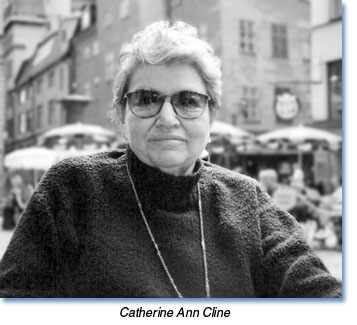
Catherine Ann Cline, a distinguished historian of contemporary Britain and the former chair of the history department of the Catholic University of America, died on October 12, 2005, at age 78 after a long illness.
Born in West Springfield, Massachusetts, Catherine Cline received her BA from Smith College, her MA from Columbia University, and her PhD from Bryn Mawr College, where she worked with Felix Gilbert. Prior to joining the faculty at Catholic University, Prof. Cline taught at Smith College, St. Mary’s College in South Bend, Indiana, and Notre Dame College of Staten Island. She received a research fellowship from the American Philosophical Society, was a member of the Faculty Seminar on African History at Columbia University, and, on April 10, 1995, was awarded the Papal Benemerenti Medal by Pope John Paul II.
In her studies of contemporary British history Catherine Cline investigated challenging, interrelated subjects. Her first book, Recruits to Labour: The British Labour Party, 1914–1931 (1963) was an innovative prosopography of 68 political converts during and after World War I. Diverse in their lives and opinions, these elite figures not only reshaped Labour’s domestic and foreign policy but were also themselves transformed by the postwar environment. Her second book, E. D. Morel, 1873–1924,The Strategies of Protest (1981), was described as the authoritative political biography of the outspoken moralist and publicist who had demanded democratic control over British diplomacy. Although she dispelled the myth of the “honest fanatic”; by exposing Morel’s vanity, self-righteousness, and self-interest, Cline also acknowledged her subject’s intellectual gifts as well as his political significance as a major critic of European imperialism, World War I, and the Versailles treaty.
Catherine Cline’s third research project, published in articles in The Journal of Modern History and Albion and presented in papers at scholarly conferences, was an investigation of British public opinion and the Treaty of Versailles. Reexamining the domestic roots of British appeasement, she probed the ways that elite British groups disseminated a negative view of the peace settlement and the impact of their critique on interwar diplomacy. A gifted writer, she also produced a steady stream of book reviews and essays in leading journals, which were always noteworthy for their conciseness and perspicacity.
Catherine Cline was a superb graduate and undergraduate teacher. Meticulous in her presentations, discerning in her interpretation of historical problems, and deeply committed to the highest professional standards, she mentored numerous students and directed excellent dissertations. As comfortable in the small seminar room as in the large lecture hall, Catherine Cline used her zest and imagination to instruct and inspire a broad range of students over a period of 42 years. As a citizen of the university, she was a dedicated and decisive colleague, willing to take unpopular stands and widely admired for her integrity. A long-standing member of the American Historical Association, the American Catholic Historical Association, and the Conference Group on British Studies, she served on several prize committees of these organizations.
Catherine Cline was great lover of literature, music, and the theater, an elegant urbanite and brilliant conversationalist with strong convictions and a wonderful wit. She was a modest person who carried her erudition and accomplishments lightly. And she was a woman of courage, sustained during her long illness by her faith and serenity.
Carole Fink
Ohio State University